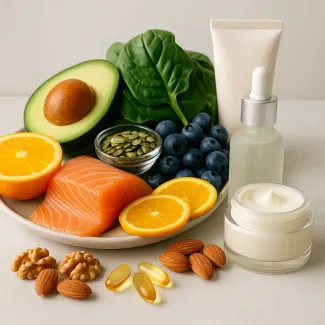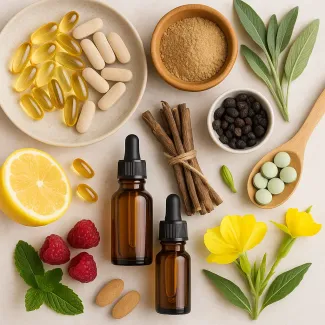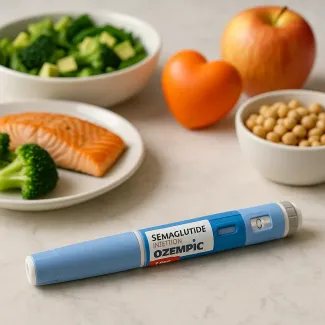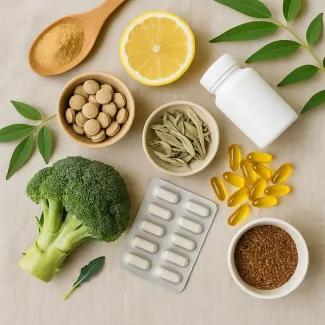
How to Maintain Radiant Skin and Optimal Nutrition After 40
Understanding the link between skin health and nutrition in your 40s and 50s
When you enter your 40s and 50s, your body undergoes various natural changes that influence both skin appearance and overall health. The production of collagen and elastin slows down, leading to fine lines, wrinkles, and a loss of skin firmness. At the same time, metabolic rate may decrease, and nutrient absorption can become less efficient. This makes it essential to focus on nutrient-rich diets and targeted skin care routines to preserve a youthful, healthy glow.
Your skin reflects what you put into your body. By combining balanced nutrition with effective skin care practices, you can support your skin’s natural barrier, improve hydration levels, and minimize visible signs of aging.
The importance of hydration for mature skin
Hydration is one of the most critical aspects of maintaining glowing skin at any age, but it becomes even more vital as you age. Mature skin tends to lose moisture more easily, making it prone to dryness and dullness.
How to boost hydration from within
- Drink at least 2 liters of water daily to help flush toxins and maintain skin elasticity.
- Include water-rich foods like cucumber, watermelon, and citrus fruits in your diet.
- Choose herbal teas that promote hydration, such as chamomile or rooibos tea.
Topical hydration strategies
- Use a hyaluronic acid serum before applying moisturizer to lock in moisture.
- Opt for ceramide-rich creams that reinforce the skin’s natural barrier.
- Apply a hydrating mask once a week to replenish lost moisture.
Essential nutrients for skin elasticity and glow
Your skin requires specific nutrients to remain firm, supple, and radiant. A diet lacking these nutrients can accelerate the signs of aging.
Vitamins and minerals your skin needs
- Vitamin C supports collagen production and brightens the complexion.
- Vitamin E protects against oxidative stress and helps repair damaged skin.
- Zinc plays a role in skin healing and inflammation reduction.
- Selenium offers antioxidant properties that protect against environmental damage.
Foods to add to your diet
- Citrus fruits (oranges, lemons, grapefruits) for a vitamin C boost.
- Nuts and seeds (almonds, sunflower seeds) for vitamin E and healthy fats.
- Seafood (oysters, salmon) for zinc and omega-3 fatty acids.
- Whole grains (quinoa, brown rice) for selenium and fiber.
Managing hormonal changes for healthier skin
Hormonal fluctuations during your 40s and 50s can have a profound impact on your skin, leading to issues like adult acne, increased sensitivity, or loss of elasticity.
Balancing your hormones naturally
- Prioritize a diet rich in phytoestrogens, such as flaxseeds and soy products.
- Include omega-3 fatty acids to help manage inflammation.
- Manage stress levels with mindfulness and gentle exercise like yoga.
Skin care adjustments during hormonal shifts
- Switch to gentle cleansers that do not strip natural oils.
- Incorporate retinoids (if suitable for your skin type) to boost collagen.
- Use SPF daily, as mature skin is more vulnerable to UV damage.
Anti-aging skin care routine essentials
Building a routine with targeted products can significantly support skin health in your 40s and 50s.
Morning skin care tips
- Cleanse with a mild, hydrating cleanser.
- Apply a vitamin C serum to brighten and protect against free radicals.
- Use a broad-spectrum sunscreen SPF 30 or higher every day.
Evening skin care tips
- Double cleanse to remove makeup and impurities.
- Use a retinol or peptide serum to stimulate cell turnover.
- Finish with a rich night cream that contains ceramides or shea butter.
Lifestyle habits that support youthful skin
Your daily habits contribute significantly to your skin’s health and vitality.
The role of sleep
Getting 7-9 hours of quality sleep allows your skin to repair itself. Poor sleep is linked to increased signs of aging like fine lines, uneven skin tone, and reduced elasticity.
Benefits of regular exercise
Exercise boosts blood circulation, delivering more oxygen and nutrients to skin cells. Activities such as brisk walking, swimming, or pilates support healthy skin while improving mood and overall well-being.
Stress management
Chronic stress can trigger skin concerns, including breakouts and dull complexion. Incorporate daily breathing exercises, meditation, or journaling to help manage stress levels effectively.
Foods to avoid for clearer, brighter skin
Certain foods can contribute to inflammation, leading to breakouts or dull skin tone.
Reduce intake of:
- Processed sugars, which can accelerate skin aging.
- Refined carbohydrates like white bread and pastries.
- Excessive dairy products, which may trigger breakouts in some individuals.
- Alcohol, which dehydrates the skin and can cause puffiness.
Supporting gut health for better skin
A healthy gut can lead to clearer, more radiant skin by reducing inflammation and supporting nutrient absorption.
How to nourish your gut
- Eat more fiber-rich foods such as lentils, apples, and leafy greens.
- Add fermented foods like yogurt, kefir, and sauerkraut for probiotics.
- Stay hydrated to support digestion and overall gut health.
The impact of antioxidants on skin vitality
Antioxidants neutralize free radicals and protect the skin from environmental damage.
Key antioxidants for skin
- Beta-carotene, found in carrots and sweet potatoes, supports skin health.
- Lycopene, present in tomatoes, helps protect against UV damage.
- Polyphenols from green tea offer anti-inflammatory benefits.
Antioxidant-rich skin care
Look for products containing green tea extract, vitamin C, or resveratrol to enhance skin resilience.
Natural oils and their benefits for aging skin
Natural oils can provide deep hydration and nourishment for mature skin.
Recommended oils
- Jojoba oil mimics skin’s natural sebum and helps balance moisture.
- Argan oil is rich in vitamin E and essential fatty acids.
- Rosehip oil supports skin regeneration and reduces the appearance of scars.
How to use oils effectively
- Apply a few drops after serum but before moisturizer.
- Mix a drop into your night cream for added nourishment.
- Use as a gentle makeup remover that also conditions the skin.
Seasonal adjustments to your skin care routine
Changing seasons affect the needs of your skin.
Winter tips
- Use richer moisturizers with shea butter or ceramides.
- Apply overnight hydrating masks to combat dryness.
- Avoid long, hot showers that strip skin of natural oils.
Summer tips
- Switch to lightweight, non-comedogenic moisturizers.
- Reapply SPF every 2-3 hours when outdoors.
- Incorporate antioxidant serums to protect against sun damage.
Importance of gentle exfoliation for mature skin
Exfoliation helps remove dead skin cells and promotes a smoother, more radiant complexion.
Best practices for exfoliation
- Use a gentle chemical exfoliant (like lactic acid) once or twice a week.
- Avoid harsh scrubs that can cause micro-tears in the skin.
- Follow with a hydrating serum or moisturizer to soothe the skin.
The role of collagen supplements in skin health
Collagen supplements have gained popularity for supporting skin structure and elasticity.
How collagen supports your skin
- Provides amino acids needed for collagen synthesis.
- May improve skin hydration and reduce fine lines with consistent use.
Tips for choosing a supplement
- Look for hydrolyzed collagen peptides for better absorption.
- Combine with vitamin C for enhanced collagen production.
Simple daily habits that enhance skin’s natural glow
Consistency in small, daily actions can yield significant long-term benefits.
Quick habits to adopt
- Always remove makeup before bed.
- Clean your makeup brushes regularly to prevent breakouts.
- Wear sunglasses to reduce squinting and protect the delicate eye area.
- Smile often — a positive mindset can reflect in your skin’s glow.
Sun protection as a key anti-aging strategy
Sun exposure is the leading external cause of skin aging.
Daily sun protection tips
- Apply SPF 30 or higher even on cloudy days.
- Wear wide-brimmed hats and protective clothing when outdoors.
- Seek shade during peak sun hours (10 a.m. to 4 p.m.).
The synergy between nutrition and skin care products
Your skin care routine and diet work together to support skin health.
How to create harmony between the two
- Pair nutrient-rich meals with supportive topical products.
- Use products that complement your diet (e.g., vitamin C serum with a vitamin C-rich diet).
- Stay consistent with both your nutrition plan and skin care regimen for best results.





